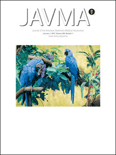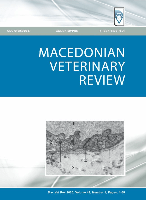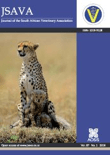
AMERICAN JOURNAL OF VETERINARY RESEARCH
Scope & Guideline
Exploring the Frontiers of Veterinary Knowledge
Introduction
Aims and Scopes
- Clinical Veterinary Medicine:
AJVR publishes research addressing clinical practices in veterinary medicine, focusing on diagnosis, treatment, and management of diseases in companion and production animals. - Translational Research:
The journal emphasizes translational research that bridges the gap between laboratory findings and clinical applications, promoting the use of scientific discoveries in everyday veterinary practice. - Innovations in Veterinary Technology:
Research involving novel technologies and methodologies, such as imaging techniques, minimally invasive surgeries, and advanced therapeutic modalities, is a consistent focus of the journal. - One Health Approach:
AJVR supports research that emphasizes the interconnectedness of animal health, human health, and environmental factors, reflecting the increasing importance of a One Health perspective. - Pharmacology and Toxicology:
The journal covers studies related to veterinary pharmacology, drug efficacy, and safety, including the impact of pharmaceuticals on animal health and welfare. - Public Health and Epidemiology:
Research addressing zoonotic diseases, antimicrobial resistance, and public health implications of veterinary practices is a key area of focus, aligning with global health initiatives.
Trending and Emerging
- Telemedicine and Remote Monitoring:
The rise of telemedicine in veterinary practice has led to an increase in research exploring remote monitoring technologies and their applications in enhancing animal care. - Regenerative Medicine:
There is a growing interest in regenerative medicine, including stem cell therapy and tissue engineering, aimed at improving recovery and treatment outcomes in various veterinary cases. - Antimicrobial Stewardship:
Research focusing on antimicrobial resistance and stewardship practices is gaining traction, reflecting the global health concern regarding the overuse of antibiotics in veterinary medicine. - Genomics and Precision Medicine:
Emerging studies utilizing genomic technologies to inform precision medicine approaches in veterinary care are becoming more prominent, aiming to tailor treatments based on genetic profiles. - Environmental and Sustainability Research:
The journal is increasingly publishing research that addresses environmental sustainability and its impact on animal health, aligning with global initiatives for responsible veterinary practices.
Declining or Waning
- Traditional Surgical Techniques:
There has been a noticeable decrease in studies focusing on traditional surgical methods as newer, minimally invasive techniques gain prevalence and popularity among veterinary practitioners. - Basic Science Research:
The journal has seen a decline in the volume of basic science research that does not have immediate clinical applications, as the focus shifts toward more applied and translational studies. - Single-Species Studies:
Research focused exclusively on single species, particularly in domestic animals, is becoming less common as the One Health approach encourages multi-species and ecological studies. - Veterinary Education Research:
There has been a reduction in publications specifically addressing veterinary education methodologies, as the journal pivots more towards clinical and applied research.
Similar Journals

REVISTA CIENTIFICA-FACULTAD DE CIENCIAS VETERINARIAS
Advancing veterinary science for a healthier tomorrow.REVISTA CIENTIFICA-FACULTAD DE CIENCIAS VETERINARIAS, published by the Universidad del Zulia, is a prominent open-access journal dedicated to advancing the fields of veterinary science, animal science, and food science. Since its inception in 1997, the journal has served as a vital platform for disseminating quality research and fostering academic dialogue among professionals and scholars in the veterinary and agricultural sectors. With its commitment to open access since 2010, the journal aims to make valuable research freely accessible to a global audience, thereby contributing to the advancement of scientific knowledge. Although currently categorized in the bottom quartile of various fields—including Animal Science and Zoology, Food Science, and Immunology—REVISTA CIENTIFICA-FACULTAD DE CIENCIAS VETERINARIAS is dedicated to nurturing innovative research that addresses pressing challenges in veterinary and related sciences. Researchers, professionals, and students will find this journal to be an important resource for quality studies that have implications for animal health, food safety, and biotechnology in the context of Venezuelan and international landscapes.

Journal of Veterinary Science
Elevating Standards in Veterinary Science Research.Journal of Veterinary Science, published by the Korean Society of Veterinary Science, is a distinguished peer-reviewed Open Access journal that has been contributing to the field of veterinary medicine since its inception in 2000. With an E-ISSN of 1976-555X, this journal not only provides critical insights for researchers globally but also maintains a strong presence within the academic community, evidenced by its impressive ranking in the Scopus database, where it stands at 44 out of 194 in the general veterinary category, placing it in the 77th percentile. The journal’s impact factor reflects its rigorous standards and the significance of the research it publishes, all while offering unrestricted access to its content since 2006, which promotes the free exchange of knowledge. Situated in the vibrant academic atmosphere of Seoul, South Korea, the Journal of Veterinary Science aims to advance veterinary research and practice, covering a broad spectrum of topics to inspire students, professionals, and established researchers alike to push the boundaries of veterinary science.

CANADIAN JOURNAL OF VETERINARY RESEARCH-REVUE CANADIENNE DE RECHERCHE VETERINAIRE
Innovative Research, Impactful Outcomes in Veterinary MedicineCanadian Journal of Veterinary Research - Revue Canadienne de Recherche Vétérinaire is a leading publication in the veterinary science community, published by the Canadian Veterinary Medical Association. Established in 1986, the journal serves as a crucial resource for researchers and practitioners alike, covering a broad spectrum of topics pertinent to veterinary medicine and animal health. With a current impact factor placing it in Q2 in the Veterinary (miscellaneous) category, it holds a rank of #85 out of 194 in Scopus for general veterinary research, demonstrating its influence and importance within the field. While the journal is not open access, it remains committed to the dissemination of high-quality research that fosters advancements in veterinary practice and education. Based in Ottawa, Canada, it strives to connect the international community of veterinary researchers and professionals through rigorous peer-reviewed articles that advance knowledge and methodologies in veterinary science.

Thai Journal of Veterinary Medicine
Elevating animal health through research and innovation.Thai Journal of Veterinary Medicine, published by Chulalongkorn University, serves as a vital resource for researchers, practitioners, and students in the field of veterinary science. With an ISSN of 0125-6491, the journal has been providing a platform for the dissemination of original research and reviews since its inception, with a focus on advancing veterinary practice and animal health in Thailand and the broader Southeast Asian region. The journal is recognized in the Scopus database, currently ranked in the Q4 category for Veterinary (miscellaneous), reflecting its commitment to quality despite being in a highly competitive space. The scope of the journal encompasses a wide array of topics pertinent to veterinary medicine, ensuring accessibility to diverse veterinary disciplines. While the journal currently does not offer an open-access option, it remains dedicated to contributing valuable knowledge and insights to the veterinary community, supporting the improvement of animal welfare and public health initiatives in the region. As it continues to publish until 2024, the Thai Journal of Veterinary Medicine invites contributions that align with its objectives of fostering scholarly discourse and advancing veterinary research.

JAVMA-JOURNAL OF THE AMERICAN VETERINARY MEDICAL ASSOCIATION
Elevating animal welfare through rigorous research.JAVMA - Journal of the American Veterinary Medical Association, a leading publication in the field of veterinary medicine, has been a cornerstone of veterinary research and practice since its inception in 1945. Published by the American Veterinary Medical Association, this esteemed journal provides a vital platform for disseminating innovative studies, clinical findings, and advancements that enhance the welfare of animals and the practice of veterinary medicine. With an impressive impact factor reflecting its scholarly influence and a position in the top quartile (Q2) among veterinary journals, JAVMA is recognized for its rigorous peer-review process and high-quality content. Although the journal does not offer Open Access, it remains accessible through a variety of academic libraries and institutions, making it a crucial resource for researchers, veterinarians, and students dedicated to advancing the field. With a Scopus rank of #92 out of 194 in the general veterinary category, JAVMA is committed to fostering knowledge and discussions that shape the future of veterinary science.

Macedonian Veterinary Review
Unleashing the potential of veterinary research worldwide.Macedonian Veterinary Review is a prominent open access journal dedicated to advancing the field of veterinary science. Published by SCIENDO, this journal provides a crucial platform for researchers, professionals, and students to share their findings and insights related to veterinary practices, animal health, and welfare. Established with the aim of fostering knowledge exchange since its inception in 2010, the journal has made significant strides, evidenced by its 2023 Scopus ranking of #131 out of 194 in the General Veterinary category, placing it in the 32nd percentile among its peers. The journal's open access model enhances the dissemination of knowledge, ensuring that vital research reaches a wider audience, thereby addressing key issues in the veterinary landscape. With its base in Macedonia and a commitment to high-quality scholarly contributions, the Macedonian Veterinary Review is an essential resource for anyone involved in veterinary research and practice, reflecting the ongoing developments and challenges in this critical field.

ISRAEL JOURNAL OF VETERINARY MEDICINE
Connecting Research and Practice in Veterinary MedicineThe Israel Journal of Veterinary Medicine, published by the Israel Veterinary Medical Association, serves as a vital resource for researchers, professionals, and students in the fields of veterinary medicine and animal science. With a commitment to advancing knowledge across diverse veterinary disciplines, this journal plays a crucial role in disseminating significant findings and innovations that influence both local and global veterinary practices. Although it currently holds a Q4 ranking in both the Animal Science and Zoology and Veterinary (miscellaneous) categories, the journal's open access policy, enabling free availability of articles, aspires to increase its accessibility and engagement among the academic community. The journal's convergence of research from 2007 to 2024 showcases its dedication to continuously contributing to the evolving landscape of veterinary science.

Journal of the South African Veterinary Association
Advancing Veterinary Science Through Open AccessJournal of the South African Veterinary Association is a prominent Open Access journal dedicated to advancing the field of veterinary science since its inception in 1945. Published by MEDPHARM PUBLICATIONS PTY LTD, this journal stands out with an impactful HIndex and a commendable categorization in 2023, ranking Q3 in Medicine (miscellaneous) and Q2 in Veterinary (miscellaneous). With a Scopus rank of 96 out of 194 in the veterinary field, it serves as an essential resource for researchers, veterinary professionals, and students, promoting the dissemination of high-quality research and knowledge. The journal offers a platform for peer-reviewed articles covering diverse topics relevant to veterinary and animal health issues, encouraging expansive dialogue and collaboration within the academic community. Based in Centurion, South Africa, and accessible globally since it adopted an Open Access model in 1997, the journal exemplifies a commitment to accessibility and the sharing of knowledge.

CANADIAN VETERINARY JOURNAL-REVUE VETERINAIRE CANADIENNE
Connecting researchers and practitioners for a healthier future.Canadian Veterinary Journal - Revue Vétérinaire Canadienne is a prominent peer-reviewed journal published by the Canadian Veterinary Medical Association. Established in 1965, this journal aims to advance knowledge within the field of veterinary medicine and contributes significantly to the development of veterinary practices through the dissemination of high-quality research. With a robust focus on both general and specialized veterinary studies, the journal holds a Q2 ranking in the Veterinary (miscellaneous) category and a Q3 categorization in Medicine (miscellaneous) as of 2023, reflecting its vital role in academic discourse. Researchers and professionals can expect a diverse range of topics that explore the intricacies of animal health and welfare, making it a vital resource for advancing veterinary science in Canada and beyond. Although the journal does not operate under an open access model, it remains a respected platform for disseminating impactful research. With a long-standing tradition of excellence, the Canadian Veterinary Journal is an invaluable tool for veterinarians, researchers, and students committed to enhancing animal health and veterinary practices.

Acta Scientiae Veterinariae
Fostering collaboration in veterinary medicine.Acta Scientiae Veterinariae is an esteemed academic journal dedicated to advancing knowledge in the field of veterinary sciences. Published by the Universidade Federal do Rio Grande do Sul, this journal serves as a vital platform for researchers, professionals, and students interested in the latest findings and developments in veterinary medicine and related disciplines. Operating under an open access model, Acta Scientiae Veterinariae ensures that its content is freely accessible, promoting widespread dissemination of research that contributes to the understanding and welfare of animal health. With an ISSN of 1678-0345 and an E-ISSN of 1679-9216, the journal has made a significant impact in its category, holding a Q4 ranking in the Veterinary (miscellaneous) category as per the latest 2023 categorizations and ranking in the 11th percentile, reflecting its continued relevance within the academic community. As it converges years from 2010 to 2024, Acta Scientiae Veterinariae continues to foster innovation and collaboration in veterinary research, making it an invaluable resource for those committed to enhancing animal health and veterinary practices.